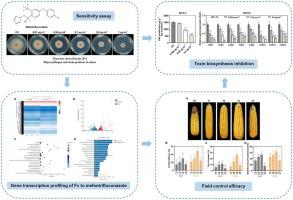Pesticide Biochemistry and Physiology ( IF 4.2 ) Pub Date : 2023-03-21 , DOI: 10.1016/j.pestbp.2023.105398 Dan He 1 , Jianrong Shi 2 , Jianbo Qiu 2 , Yiping Hou 3 , Yuzhou Du 4 , Tao Gao 5 , Wenwen Huang 2 , Jiawen Wu 6 , Yin-Won Lee 7 , Sherif Ramzy Mohamed 8 , Xin Liu 2 , Jianhong Xu 2

|
Fusarium ear rot (FER) is a serious fungal disease occurring the late growth stage of maize. FER not only reduces the yield of maize but also causes mycotoxin contamination, which affects the quality of maize and threatens human and animal health. Fusarium verticillioides is the predominant causative pathogen of FER worldwide. At present, there is no registered fungicide for use against maize FER in China. The novel isopropyl alcohol-triazole fungicide mefentrifluconazole (MFZ) has been shown to be effective against several Fusarium spp., but little is known about its specific activity against F. verticillioides. MFZ exhibited strong antifungal activities against 50 strains of F. verticillioides collected from the major maize-growing areas in China. MFZ inhibited mycelial growth, conidium production, germination and germ tube elongation of F. verticillioides. MFZ treatment significantly reduced fumonisin production and the expression levels of fumonisin biosynthetic genes. Genome-wide transcriptional profiling of F. verticillioides in response to MFZ indicated that the expression of genes involved in ergosterol biosynthesis, including fungicide target genes (cyp51 genes), was significantly downregulated by MFZ. MFZ treatment resulted in reduced ergosterol production and increased glycerol and malonaldehyde production as well as relative conductivity in F. verticillioides. A 2-year field experiment showed a significant reduction in FER severity in maize after spraying with MFZ at the tasseling stage. This study evaluated the potential of MFZ to control FER in maize and provides insights into its antifungal activities and mechanism of action against F. verticillioides.
中文翻译:

一种新型三唑类杀菌剂甲芬氟康唑对主要玉米病原体轮枝状镰刀菌的抗真菌活性
镰刀菌穗腐病 (FER) 是一种严重的真菌病害,发生在玉米生长后期。FER不仅降低玉米产量,还会造成霉菌毒素污染,影响玉米品质,威胁人畜健康。Fusarium verticillioides是全世界 FER 的主要病原体。目前,国内尚无登记的用于防治玉米FER的杀菌剂。新型异丙醇-三唑类杀菌剂甲氧嘧啶氟康唑 (MFZ) 已被证明对几种镰刀菌有效,但对其对轮枝状镰刀菌的特异性活性知之甚少。MFZ 对 50 株F. verticillioides表现出强烈的抗真菌活性采自我国主要玉米产区。MFZ 抑制F. verticillioides的菌丝体生长、分生孢子产生、发芽和芽管伸长。MFZ 处理显着降低了伏马菌素的产量和伏马菌素生物合成基因的表达水平。F. verticillioides响应 MFZ的全基因组转录谱分析表明,麦角甾醇生物合成相关基因的表达,包括杀菌剂靶基因( cyp51基因),被 MFZ 显着下调。MFZ 处理导致麦角甾醇产量减少,甘油和丙二醛产量增加以及轮枝状镰孢菌的相对电导率. 一项为期 2 年的田间试验表明,在抽雄阶段喷洒 MFZ 后,玉米的 FER 严重程度显着降低。本研究评估了 MFZ 控制玉米 FER 的潜力,并提供了对其抗真菌活性和对F. verticillioides 的作用机制的见解。












































 京公网安备 11010802027423号
京公网安备 11010802027423号